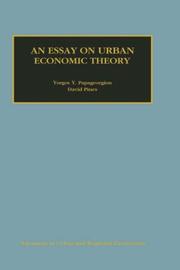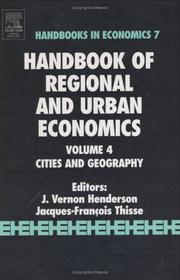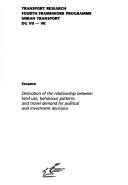| Listing 1 - 10 of 14 | << page >> |
Sort by
|

ISBN: 0792383435 Year: 1999 Publisher: Boston Dordrecht London Kluwer Academic Publishers
Abstract | Keywords | Export | Availability | Bookmark
 Loading...
Loading...Choose an application
- Reference Manager
- EndNote
- RefWorks (Direct export to RefWorks)
Book
Abstract | Keywords | Export | Availability | Bookmark
 Loading...
Loading...Choose an application
- Reference Manager
- EndNote
- RefWorks (Direct export to RefWorks)
Urban economics --- Regional economics --- Economie urbaine --- Economie régionale
Book
ISBN: 2738482112 9782738482112 Year: 1999 Volume: *14 Publisher: Paris : Editions L'Harmattan,
Abstract | Keywords | Export | Availability | Bookmark
 Loading...
Loading...Choose an application
- Reference Manager
- EndNote
- RefWorks (Direct export to RefWorks)
Economics [Urban ] --- Economie [Stedelijke ] --- Economie urbaine --- Stedelijke economie --- Urban economics --- Social geography --- Economic geography --- Municipal services --- Cross-cultural studies --- Municipal services - Cross-cultural studies --- GEOGRAPHIE URBAINE --- METROPOLES

ISBN: 2738475337 Year: 1999 Volume: 3 Publisher: Paris : Harmattan,
Abstract | Keywords | Export | Availability | Bookmark
 Loading...
Loading...Choose an application
- Reference Manager
- EndNote
- RefWorks (Direct export to RefWorks)
Cities and towns --- Urban economics --- Urban policy --- Urbanization --- Villes --- Economie urbaine --- Politique urbaine --- Urbanisation --- Marseille (France) --- Marseille (France) --- Marseille (France) --- Marseille (France) --- Economic conditions --- Conditions économiques
Book
ISBN: 2738473601 Year: 1999 Volume: 4 Publisher: Paris : L'Harmattan,
Abstract | Keywords | Export | Availability | Bookmark
 Loading...
Loading...Choose an application
- Reference Manager
- EndNote
- RefWorks (Direct export to RefWorks)
Cities and towns --- Urban economics --- Urbanization --- Villes --- Economie urbaine --- Urbanisation --- Amsterdam (Netherlands) --- Amsterdam (Pays-Bas) --- History --- Economic conditions. --- Social conditions. --- Histoire --- Conditions économiques --- Conditions sociales --- City planning --- Geografie --- Urban renewal --- Sociale geografie --- Bewoning en leefgemeenschap.

ISSN: 01697218 ISBN: 0444509674 0444821384 0444879692 0444879706 0444879714 9780444595171 9780444595317 9786611012830 1281012831 0080495125 9780444509673 9780444879691 9780444879714 0444595171 0444595317 9780444821386 9780444879707 Year: 1999 Volume: 7, etc. Publisher: Amsterdam : Elsevier,
Abstract | Keywords | Export | Availability | Bookmark
 Loading...
Loading...Choose an application
- Reference Manager
- EndNote
- RefWorks (Direct export to RefWorks)
000.1 --- 911.4 --- Algemene werken --- Economische geografie --- Regional economics --- Urban economics --- Handbooks, manuals, etc --- #SBIB:33H000 --- #SBIB:HIVA --- Cities and towns --- City economics --- Economics of cities --- Economics --- Regional planning --- Regionalism --- Space in economics --- Economie: algemene werken --- Economic aspects --- Economic geography --- Handbooks, manuals, etc. --- Economie régionale --- Economie urbaine --- Guides, manuels, etc --- ELSEVIER-B EPUB-LIV-FT --- Économie urbaine --- Géographie --- Économie régionale --- Regional economics - Handbooks, manuals, etc --- Urban economics - Handbooks, manuals, etc --- Villes
Book
Year: 1999 Publisher: Washington, D.C., The World Bank,
Abstract | Keywords | Export | Availability | Bookmark
 Loading...
Loading...Choose an application
- Reference Manager
- EndNote
- RefWorks (Direct export to RefWorks)
April 1999 - Considering the positive impact decentralization has had on regional economic performance and expenditure structure, Russia's federal government should: Decisively protect local self-governance and budget autonomy; Make intergovernmental fiscal relations more transparent; Develop universal models of interactions between regional and municipal governments; Impose stricter limits on total debt and budget deficits of subnational governments. To shed light on decentralization in Russia, Freinkman and Yossifov examine intergovernmental fiscal relations within regions. To analyze trends, they review channels of fiscal allocation within regions-tax sharing and local transfer schemes. To evaluate the potential impact of various fiscal decentralization patterns on regional economic performance (including growth and the budget deficit), they study data on the structure of 89 Russian consolidated regional budgets for 1992-96. They find that local governments' relative share of Russia's consolidated budget, although substantive (roughly a quarter of the total budget), did not expand after 1994. The federal government's relative role in financing public goods and services declined as the relative role of local governments increased substantially. Local governments collected more revenues in 1996 (6.4 percent of GDP) and spent more than regional governments. They also substantially increased social financing (including health, education, and social protection). Russia made no progress toward a more transparent system for tax assignments. The average level of expenditure decentralization is similar for ethnically Russian regions and national republics and okrugs but revenue arrangements differ greatly. True decentralization has taken place in oblasts and krais, where local authorities are provided with a bigger share of subnational tax revenues. A redistribution model applies in republics and autonomous okrugs, where greater local outlays have been financed through larger transfers from regional governments. Regions near each other tend to have similar budget arrangements-the result of intensive interactions between neighbors and probably supported by the activities of regional associations. The size of a region's territory does not influence decentralization outcomes. Fiscal decentralization seems positively related to the share of education spending in regional budgets. And regions with more decentralized finances tend to experience less economic decline. But budget control is weaker in more decentralized regions. Instability and lack of transparency in intergovernmental fiscal relations provide subnational governments little incentive for responsible fiscal policy. Further decentralization without greater transparency could bring greater debt and deficits. This paper-a product of the Poverty Reduction and Economic Management Sector Unit, Europe and Central Asia Region - is part of a larger effort in the unit to study fiscal decentralization in transition economies. Lev Freinkman may be contacted at lfreinkman@worldbank.org.
Accounting --- Accounting Standards --- Budget --- Budget Defic Budgets --- Debt Markets --- Debts --- Decentralization --- Expenditure --- Expenditures --- Federal Budget --- Finance --- Finance and Financial Sector Development --- Fiscal Decentralization --- Intergovernmental Fiscal Relations and Local Finance Management --- Local Governments --- Municipal Financial Management --- Pension --- Pension Fund --- Public and Municipal Finance --- Revenue --- Revenues --- Share --- Shares --- Tax --- Urban Development --- Urban Economics
Book
Year: 1999 Publisher: Washington, D.C., The World Bank,
Abstract | Keywords | Export | Availability | Bookmark
 Loading...
Loading...Choose an application
- Reference Manager
- EndNote
- RefWorks (Direct export to RefWorks)
May 1999 - Institutional arrangements have helped Colombia manage the fiscal aspects of decentralization, despite the country's political problems. Colombia's political geography contrasts sharply with its economy. Physical characteristics and guerilla war fragment the country geographically, yet it has a long tradition of political centrism and macroeconomic stability. Recently, with political and economic decentralization, there has been some weakening of macroeconomic performance. Dillinger and Webb explore institutional arrangements that have helped Colombia manage the fiscal aspects of decentralization, despite the country's political problems. Fiscal decentralization proceeded rapidly in Colombia. Education, health, and much infrastructure provision have been decentralized to the departmentos and municipios. Decentralization has led to substantial but not overwhelming problems, both in maintaining fiscal balance nationally (as resources are transferred to subnational levels) and in preventing unsustainable deficits by the subnational governments. The problems have arisen because central government interference prevents departments from controlling their costs and because of expectations of debt bailouts. Both are legacies of the earlier pattern of management from the center, and some recent changes-especially about subnational debt-may improve matters. Colombia's traditional political process has had difficulty dealing with problems of decentralization because traditional parties are weak in internal organization and have lost de facto rule over substantial territories. The fiscal problems of subnational government have been contained, however, because subnational governments are relatively weak politically and the central government, for the time being, has been able to enforce restrictions on subnational borrowing. This paper-a product of the Poverty Reduction and Economic Management Sector Unit, Latin America and Caribbean Region-is part of a larger effort in the region to examine the macroeconomic consequences of decentralization. The authors may be contacted at wdillinger@worldbank.org or swebb@worldbank.org.
Bank --- Banks and Banking Reform --- Budget --- Debt --- Debt Markets --- Decentralization --- Decentralization Process --- Deconcentration --- Deficits --- Finance and Financial Sector Development --- Financial Literacy --- Fiscal Decentralization --- Fiscal Deficits --- Interest --- Intergovernmental Relations --- Laws --- Local Governments --- Macroeconomic Stability --- Municipal Financial Management --- Municipalities --- Public and Municipal Finance --- Public Sector Economics and Finance --- Revenue --- Risk --- Subnational Governments --- Transfers --- Urban Development --- Urban Economics --- Value

ISBN: 9282872211 9789282872215 Year: 1999 Volume: 98
Abstract | Keywords | Export | Availability | Bookmark
 Loading...
Loading...Choose an application
- Reference Manager
- EndNote
- RefWorks (Direct export to RefWorks)
Economic geography --- Transport. Traffic --- European Union --- Urban transportation --- Land use, Urban --- Transports urbains --- Utilisation urbaine du sol --- Decision making --- -Land use, Urban --- -Urban transportation --- -City transportation --- Metropolitan transportation --- Municipal transportation --- Transportation, Urban --- City planning --- Transportation --- Urban policy --- Urban land use --- Cities and towns --- Urban economics --- Urban renewal --- Deciding --- Decision (Psychology) --- Decision analysis --- Decision processes --- Making decisions --- Management --- Management decisions --- Choice (Psychology) --- Problem solving --- -Decision making --- City transportation --- Urban transportation - European Union countries --- Land use, Urban - European Union countries --- Decision making - European Union countries
Book
Abstract | Keywords | Export | Availability | Bookmark
 Loading...
Loading...Choose an application
- Reference Manager
- EndNote
- RefWorks (Direct export to RefWorks)
May 1999 - Which factors prevent the rural poor and other socially excluded groups from having access to land in Orissa, India? The authors report on the first empirical study of its kind to examine - from the perspective of transaction costs--factors that constrain access to land for the rural poor and other socially excluded groups in India. They find that: Land reform has reduced large landholdings since the 1950s. Medium size farms have gained most. Formidable obstacles still prevent the poor from gaining access to land; The complexity of land revenue administration in Orissa is partly the legacy of distinctly different systems, which produced more or less complete and accurate land records. These not-so-distant historical records can be important in resolving contemporary land disputes; Orissa tried legally to abolish land-leasing. Concealed tenancy persisted, with tenants having little protection under the law; Women's access to and control over land, and their bargaining power with their husbands about land, may be enhanced through joint land titling, a principle yet to be realized in Orissa; Land administration is viewed as a burden on the state rather than a service, and land records and registration systems are not coordinated. Doing so will improve rights for the poor and reduce transaction costs--but only if the system is transparent and the powerful do not retain the leverage over settlement officers that has allowed land grabs. Land in Orissa may be purchased, inherited, rented (leased), or--in the case of public land and the commons--encroached upon. Each type of transaction--and the State's response, through land law and administration--has implications for poor people's access to land. The authors find that: Land markets are thin and transaction costs are high, limiting the amount of agricultural land that changes hands; The fragmentation of landholdings into tiny, scattered plots is a brake on agricultural productivity, but efforts to consolidate land may discriminate against the rural poor. Reducing transaction costs in land markets will help; Protecting the rural poor's rights of access to common land requires raising public awareness and access to information; Liberalizing land-lease markets for the rural poor will help, but only if the poor are ensured access to institutional credit. This paper--a product of the Rural Development Sector Unit, South Asia Region--is part of a larger effort in the region to promote access to land and to foster more demand-driven and socially inclusive institutions in rural development. Robin Mearns may be contacted at rmearns@worldbank.org.
Access To Land --- Charges --- Common Property Resource Development --- Communities & Human Settlements --- Contracts --- Fees --- Finance and Financial Sector Development --- Forestry --- Grants --- Income --- Institutional Analysis --- Institutional Reform --- Institutional Reforms --- Land --- Land Tenure --- Land Use --- Land Use and Policies --- Poverty Reduction --- Public --- Public and Municipal Finance --- Public Sector Management and Reform --- Revenue --- Revenue Collection --- Rural Development --- Rural Development Knowledge and Information Systems --- Rural Land Policies for Poverty Reduction --- Social Exclusion --- State Governments --- States --- Subnational Governance --- Urban Areas --- Urban Development --- Urban Economics --- Urban Governance and Management
| Listing 1 - 10 of 14 | << page >> |
Sort by
|

 Search
Search Feedback
Feedback About
About Help
Help News
News